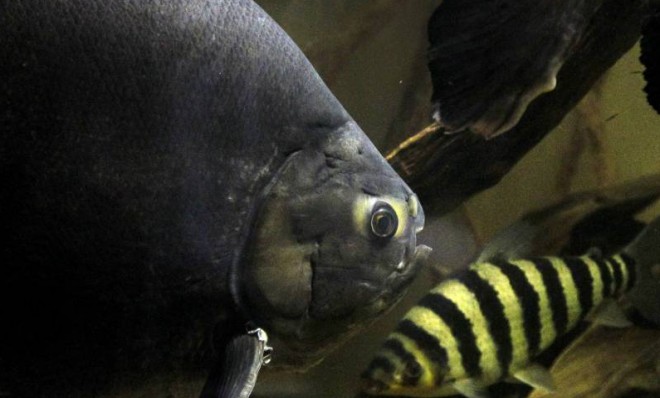Should men be worried about the 'testicle-eating' pacu fish?
Meet the fish known as the "ball cutter"


As a kid, your mom may have told you to never go swimming within a half hour of eating. What she probably didn't tell you was to keep an eye out for a massive Amazonian fish with a penchant for nibbling on human testicles.
Yet that's what Danish wildlife experts warned this week after a pacu — a cousin of the more well-known piranha — turned up in waters separating that nation from Sweden. More to the point, they offered the friendly suggestion that swimmers "best keep their swimsuits well tied" lest the fish opt to make a meal of their exposed genitals.
At first glance, the pacu looks like something straight out of a horror movie. They can grow up to 55 pounds, and have a set of sharp teeth that look unnervingly human.
The Week
Escape your echo chamber. Get the facts behind the news, plus analysis from multiple perspectives.

Sign up for The Week's Free Newsletters
From our morning news briefing to a weekly Good News Newsletter, get the best of The Week delivered directly to your inbox.
From our morning news briefing to a weekly Good News Newsletter, get the best of The Week delivered directly to your inbox.
However, whether the fish are, in fact, a reproductive risk to humans, is very much in doubt.
Unlike the piranha, pacu are vegetarians. They feed mainly on fruits and nuts that have fallen into the water, using their powerful jaws to crack the shells and get at the meat inside.
Perhaps that explains why the fish have such a terrifying reputation, since their diet lends itself so easily to double entendre. They're even sometimes referred to as the "nutcracker fish."
Much of the ball-biting legend is built on an incident in Papua New Guinea a few years back in which two fisherman allegedly died of blood loss after being castrated by a hungry pacu. That report remains unconfirmed, but even if true, it's unlikely the fish have really developed a taste for human testicles.
A free daily email with the biggest news stories of the day – and the best features from TheWeek.com
Here's Jeremy Wade, host of Animal Planet's "River Monsters," with his take on the legend:
In Papua New Guinea, [Pacu] have bitten people; however, this was following a stocking of thousands of fish, into a situation with very few native species and a shortage of their preferred type of food (seeds and nuts). The fish in the reports are almost certainly pet fish that outgrew their tanks. In order to breed, there would need to be many more of them in the water. While it would not be true to say there is no risk of being bitten by a pacu in the U.S., the chances would be very small. Driving to and from the lake would be many times more dangerous. [Animal Planet]
Even the Danish scientists who issued that initial warning have since said they didn't intend it to be taken quite so literally.
"All we said last week (with a smile) was that male swimmers should keep their pants on in case there are more pacus out there in our cold Baltic waters," Peter Rask Møller of Denmark's University of Copenhagen, explains to National Geographic, adding that a pacu attack is "highly unlikely, of course."
Hear that, everyone? You're free to go skinny-dipping to your hearts' content.
Jon Terbush is an associate editor at TheWeek.com covering politics, sports, and other things he finds interesting. He has previously written for Talking Points Memo, Raw Story, and Business Insider.
-
 Political cartoons for January 31
Political cartoons for January 31Cartoons Saturday's political cartoons include congressional spin, Obamacare subsidies, and more
-
 Syria’s Kurds: abandoned by their US ally
Syria’s Kurds: abandoned by their US allyTalking Point Ahmed al-Sharaa’s lightning offensive against Syrian Kurdistan belies his promise to respect the country’s ethnic minorities
-
 The ‘mad king’: has Trump finally lost it?
The ‘mad king’: has Trump finally lost it?Talking Point Rambling speeches, wind turbine obsession, and an ‘unhinged’ letter to Norway’s prime minister have caused concern whether the rest of his term is ‘sustainable’
